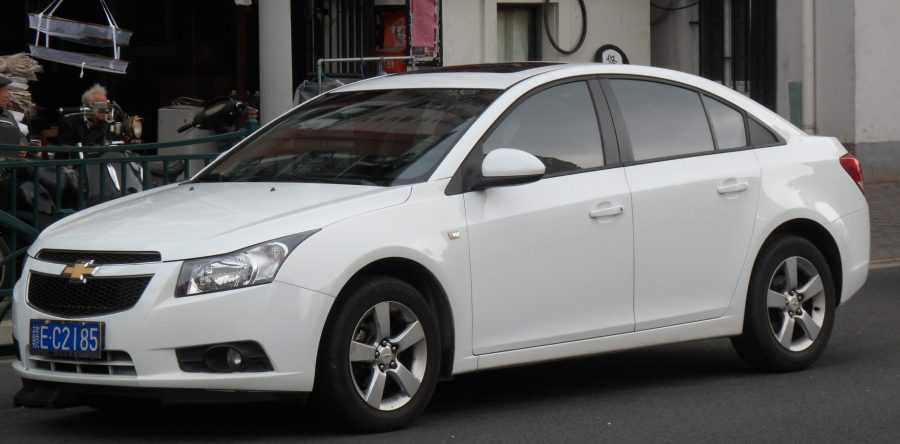
The first indication that the catalytic converter in your Chevy Cruze may need replacement would be a check engine light and corresponding P0420 code. On most vehicles, this is a pretty straightforward diagnosis that we have outlined here. But the Cruze is a relatively new car, and this error seems to be most common between 80k and 100k miles, conveniently just after the federal warranty on emissions components ends. What could cause this failure so early in the car’s life?
Turbochargers are a very well-documented failure point on any vehicle with the 1.4L turbocharged engine; not just on the Cruze, but also on the Chevy Sonic, Trax SUV and Buick Encore that share the same engine. The most common reason for a turbocharger replacement due to normal wear is that the seals in the center section of the turbo have worn out, leaking oil into the intake or exhaust. Oil leaking into the exhaust would definitely clog up your catalytic converter and cause this emissions code.
However, turbo failures on the 1.4T are largely due to a design flaw where the bypass valve spring would wear out prematurely. This issue can definitely cause premature wear to the center bearing of your turbo; an open vacuum line can also let dirt and contaminants, neither of which are healthy for a bearing that can spin at 200,000 RPM. But in our extensive experience with these engines, the turbos aren’t being replaced due to oil consumption or wear on the bearing. When the bypass valve is stuck open, it’s harder for the turbo to spool up boost pressure, which causes a very noticeable loss in power; essentially, the turbo stops doing its main job. So, while turbo failure can cause cat failure, and turbo failure is extremely common on these vehicles, the two phenomena do not appear to be related.
According to owners who have fixed this issue on their own, a more likely culprit seems to be GM extending the service interval for the spark plugs a little longer than the original spark plugs seem to be able to handle. General Motors advises replacing the spark plugs on the 1.4T at 100,000 miles. While 100k is very doable with high-tech modern spark plugs made of iridium or other rare-earth minerals, the plugs GM installed at the factory are made of platinum. While this is definitely an improvement over traditional copper plugs (at least in terms of life and wear), these are considered a “mid-tier” option in the aftermarket, and it’s hard to find platinum plugs that are rated to 100,000 miles.
Extending the use of platinum-tipped spark plugs past their usual expected lifespan has a couple side effects as they age. First of all, adding to the heat cycling makes the plugs harder to remove whenever you do replace them; a common complaint specific to the 1.4T is the rubber spark plug coil boots melting to the plug and being hard to remove and reuse. But the more relevant side effect is that they just stop doing their job as effectively; the spark they fire can be weak or mis-timed, causing a slight misfire, or not igniting at all and letting unburnt gas get into the exhaust. Unburnt fuel is a hydrocarbon, which is one of the main pollutants (along with NOx) that a catalytic converter is designed to keep from getting into the atmosphere. Ideally, this issue would be caught by your engine’s computer, either by the knock sensor recognizing that ignition didn’t happen as intended, or the upstream O2 sensor noticing a higher level of hydrocarbons in the exhaust gases. Either one of these would trigger a check engine light on your dash, and if it’s not addressed as soon as possible, continuing to drive the vehicle like this will absolutely cause accelerated wear to the emissions systems of your vehicle.
So how can you prevent this? You should, at minimum, get your vehicle diagnosed and repaired as soon as possible after a check engine light comes on to limit any potential damage. If you own a Cruze or any other vehicle with the 1.4T, consider replacing your spark plugs a little sooner than advised, somewhere between 60-80k miles. When you replace your original plugs, there are three main material types to consider:
Copper: This is the best material conductor and will ensure the best performance, but copper plugs rarely last longer than about 30k miles. They are, however, usually the least-expensive plugs available.
Iridium: Their performance is close enough to copper to not make a difference on an otherwise unmodified vehicle, but they can last much longer, although they tend to cost a little more as well.
Platinum: These are going to be somewhere in the middle of copper and iridium, both in terms of the performance/longevity balance and in price (an important consideration, since you would need to buy four plugs)
If you’re going to replace your plugs, consider replacing the ignition coils at the same time; it’s the same amount of labor, but will ensure better long-term reliability. It’s also nice to have replacement coil packs available when you replace the plugs, since the original coil boots have a tendency to tear when you remove them for the first time, which would keep you from being able to re-use them.
What if it’s too late to avoid the damage and now you definitely need to replace your converter? There are a few different options, even for the same vehicle, making the process of selecting a replacement cat harder than many other parts. You will need to check if your area requires a CARB-legal replacement converter; more and more states are adopting California’s emissions standards, so even if you aren’t in CA, your local government may require a CA-legal replacement. These cars have two converters total; an upstream one located on the exhaust manifold on 1.8L cars or just downstream from the turbo, and a rear or downstream converter located on the exhaust pipe under the car. From there, you can also choose a direct-fit replacement that bolts in like OEM, or a “universal-fit” where you’ll need to cut the old converter out of your exhaust pipe and weld in the new one. A universal converter may be cheaper to purchase, but installation will likely be more expensive, and isn’t as DIY-friendly either.
For more knowledgeable assistance in getting replacement emissions parts for your Chevy Cruze or any other vehicle, contact BuyAutoParts for help! We carry direct-fit replacement catalytic converters with lifetime warranties from known and trusted brands like MagnaFlow, Walker, Flowmaster, DEC, Davico and Eastern Manufacturing. All of these will fit and function like OEM, and every item on our site is backed by a minimum one-year, unlimited mileage warranty with extended and lifetime warranty options available at checkout.
| Fitment | Location | CA Legal? | Order Link |
| 2011-2013 1.4T | Downstream | Yes | Order Here |
| 2011-2016 1.8L | Downstream | No | Order Here |
| 2011-2017 1.4T | Upstream | No | Order Here |
| 2011-2015 1.8L | Upstream | No | Order Here |
| 2011-2015 1.4T | Downstream | No | Order Here |






